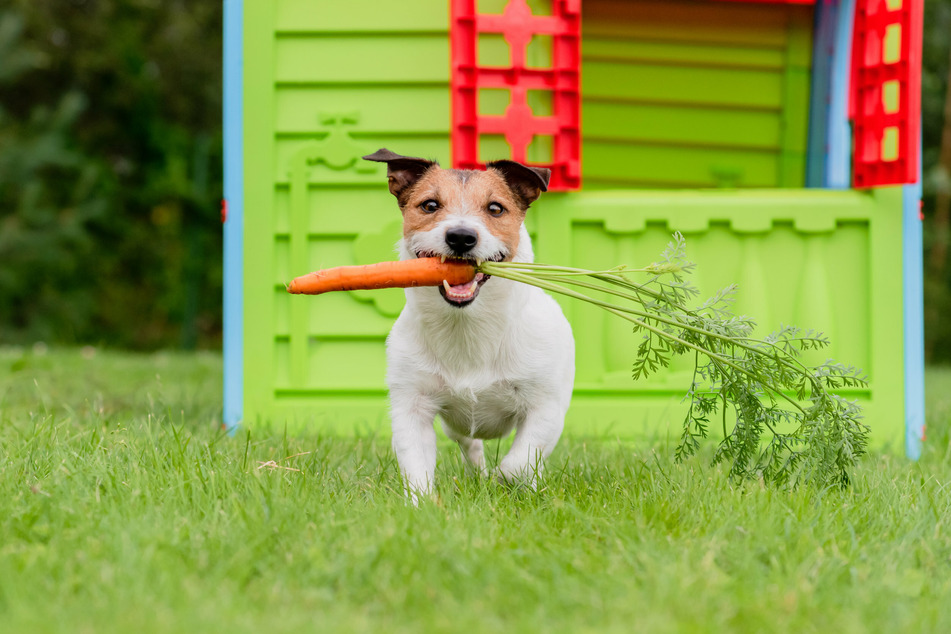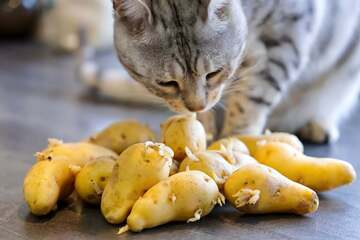Should your dog switch to a vegan diet?
Feeding your dog a vegan diet makes sense to consumers concerned about factory farming and its impact on climate change. But how does it actually affect your pet's health?

Farming animals for food and the climate crisis have spoiled some people's appetite for meat.
When it comes to pets, however, people are being confronted with a dilemma. How is it justifiable to provide pounds of meat for dogs and cats that you yourself reject for ethical or other reasons?
In the past, dogs had to make do with leftovers. Today there is food specially adapted to the needs of pets, some of whose ingredients read like those of a dish for humans: exclusively organic, gluten-free, vegetarian, or vegan.
But the vegan dog diet has been met with reservations among both experts and dog lovers.
"Many still see the wolf in the dog, but don't know that even the wolf didn't exclusively eat meat," said Volker Wilke from the Institute for Animal Nutrition at the University of Veterinary Medicine. "In the thousands of years of domestication, it was fed as an omnivore and in part much less meat than today."
But is exclusively plant-based food a sufficiently healthy diet for dogs? A new study dove in to find out.
Dogs on a vegan diet: A new study looks closer

A study recently published in the journal PLOS ONE has provided some initial clues.
British and Australian researchers asked more than 2,500 owners about the health of their dogs, the frequency of vet visits, and the medication they receive.
Some 54% fed their dogs conventional food, while 33% used raw meat and 13% fed their dogs a vegan diet.
The dogs that were fed conventional food seemed to be the least healthy, the scientists found. And dogs that ate raw meat were slightly healthier than those fed a vegan diet.
However, the differences between these two groups could also be explained by the fact that the dogs eating raw meat were younger on average than the vegan dogs.
Previous studies had also shown that the risk of malnutrition and the ingestion of pathogens is greater with a raw meat diet.
Taken together, the experts therefore concluded that a balanced vegan diet is the healthiest and least dangerous for dogs.
Dogs eating vegan is "a niche topic"

So far, there have only been a few studies on this. For clear evidence, however, studies would be needed on every single nutrient in a dog's diet. But even taking blood from a dog for research is considered an experiment that requires authorization.
According to earlier studies, people who do not eat meat themselves are more likely to feed their dog a vegan or vegetarian diet.
Researchers at Wilke's institute have been working on meat-free diets for dogs for a long time. "Previous studies indicate that dogs can also be supplied with all the necessary nutrients through a plant-based diet using certain additives," he said.
It is also more difficult to prepare a vegan diet and requires a lot of expertise to ensure that it meets requirements.
But do dogs who have been fed conventional food like vegan food at all?
Wilke wanted to test this in a blind study, in which 24 students and their dogs took part. One part fed the dogs vegan dry food from two manufacturers, a control group continued to feed food containing meat.
Over a period of two weeks, the owners were to record whether their dog liked to eat the food and the condition of its feces.
"Among the animals with vegan food, there were three dogs that refused it," says Wilke. "The others, however, were happy to eat it."
The study is not representative because of the small number of participants.
Wilke said that although interest in vegan nutrition for dogs is growing, it is still a niche topic. In order to be able to assess exactly how it benefits the dogs, long-term studies are needed that examine various objective health parameters such as blood values, effects on the fur, and the animals' fitness.
Cats, meanwhile, are a whole different beast. Wilke warns that cats are pure carnivores and cannot be fed a vegan diet.
Cover photo: 123RF/helga1981

